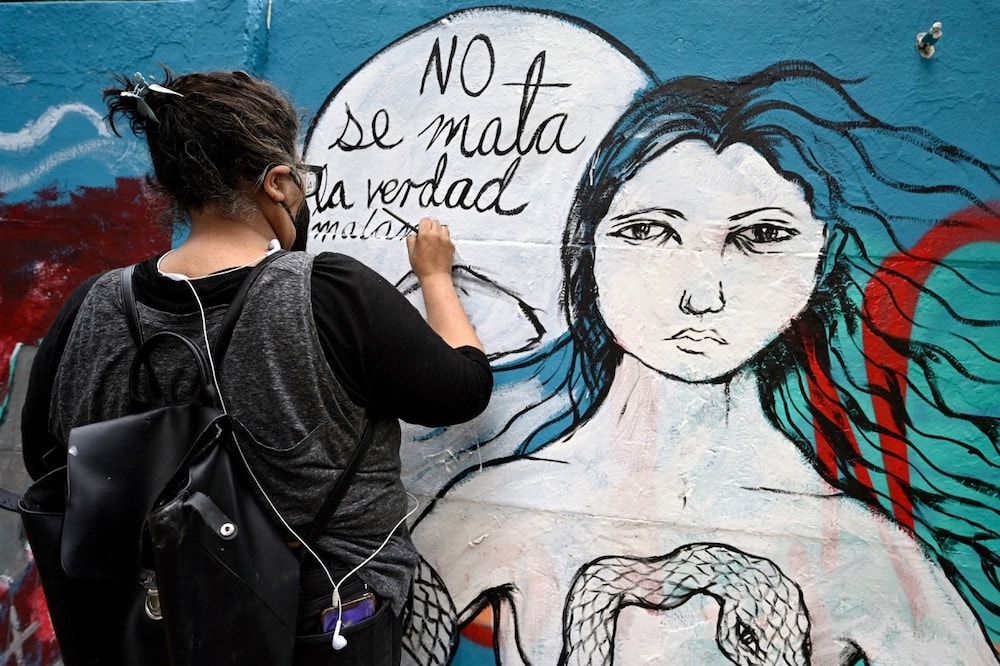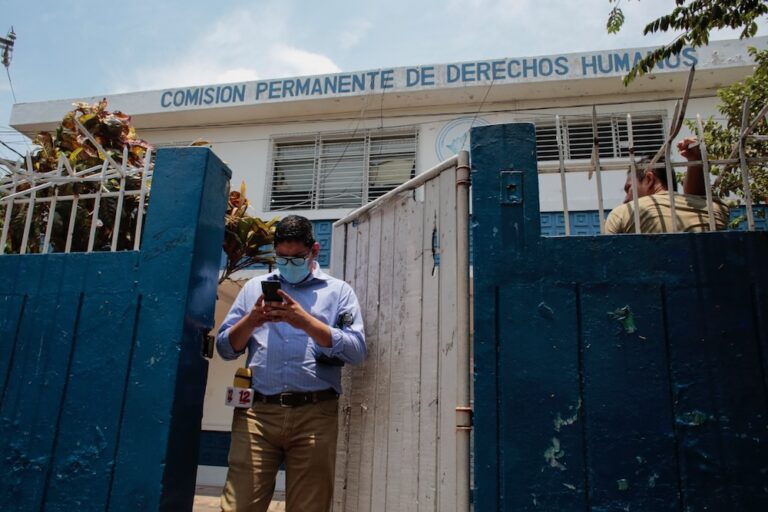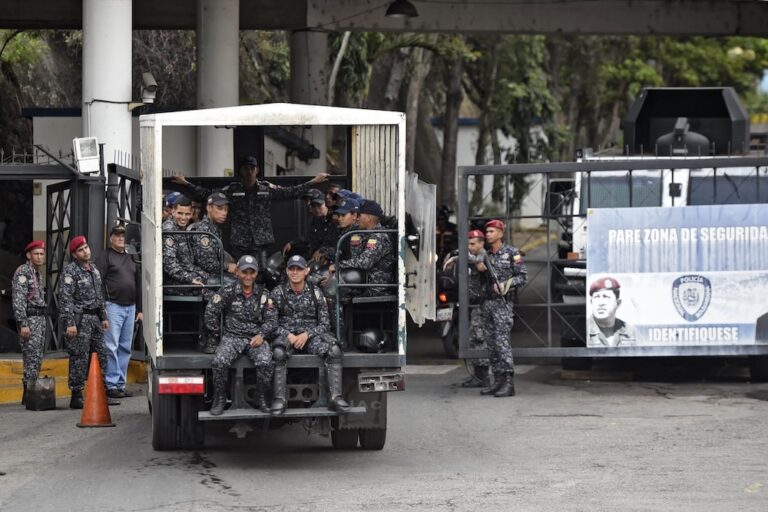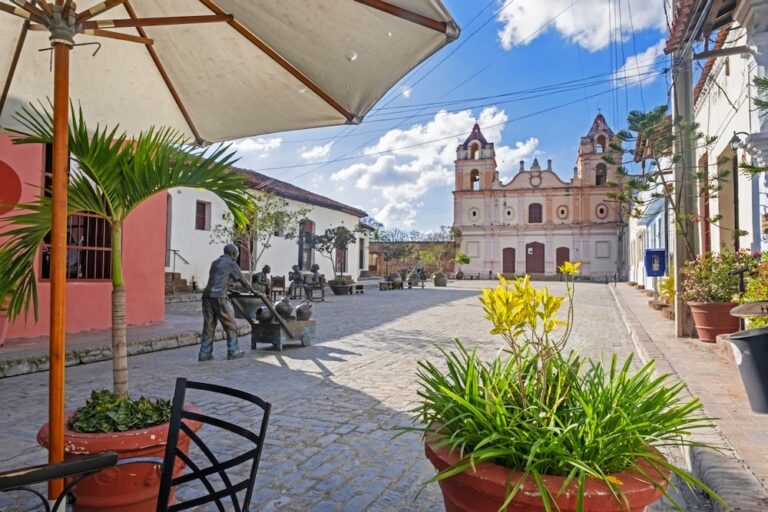IFEX Regional Editor Laura Vidal reflects on how 2022 in the Americas was marked by violence, surveillance and censorship, but also by civil society organisations pushing back against impunity and abuse, and strong, collective citizen-led action.
As a new year starts, we take a look back at one of the most challenging years for the press and for civic space in the Americas in 2022, and the proven power and potential of civil society to counter these challenges.
“A tragic year”: Violence and impunity
At the end of 2022, a powerful joint statement denounced the extraordinary violence the Americas had faced, calling it a “tragic year for the press.” Violence took many forms, the most extreme resulting in the death of at least 37 journalists in a number of countries in the region, including Mexico, Haiti, Colombia, Paraguay, Honduras and the US.
The statement, by ARTICLE 19 Mexico and Central America, the Committee to Protect Journalists, Colombia’s Fundación para la Libertad de Prensa, Reporters Without Borders, the Inter American Press Association, the network Voces del Sur, and IFEX-ALC, painted a disturbing picture of the many factors that contributed to making the work of the press so difficult – and so dangerous.
One element has been the resurgence of authoritarian politicians, who tend to include attacking the press and stigmatising journalists in their playbook. Another is the growing (and increasingly sophisticated) use of online disinformation, which intensifies during electoral periods.
Countering threats starts with knowing what they are: Civil society organsations (CSOs), including IFEX member Abraji in Brazil, closely monitored risks to journalists in 2022, as did ANP in Bolivia, FOPEA in Argentina, and IPYS in Peru.
Work to counter mis- and disinformation is unceasing, and the context is constantly evolving and changing. Many organisations in the region have produced strategic content, reports and campaigns, to strengthen public understanding of the issues and enrich media literacy, some of it specific to indigenous communities.
Other responses involved Brazil’s rocky election season in 2022.
Numerous campaigns, among them strategic and sustained actions by IFEX associated with its Civic Space campaign, encouraged Brazilians to vote and highlighted the importance of freedom of expression in ensuring a robust civic space and free and fair elections. The stakes were high – as described in a widely-shared Editorial.
Alliances were also created between the Superior Electoral Court and various platforms and civil society organisations to work on designing strategies to tackle disinformation, including through the creation of easy-to-understand and sharable content.

Illustration of a smartphone screen displaying the phrase “Fake News”, in front of a desktop screen showing several news stories research reports about fake news and disinformation related to the Brazilian presidential election, in Rio de Janeiro, Brazil, 29 August 2022. MAURO PIMENTEL/AFP via Getty Images
The end of the election was not the end of the story, however. On 8 January 2023, pro-Bolsonaro groups invaded and attacked government buildings, demanding a coup to reinstate former president Jair Bolsonaro to power. Civil society organisations, including IFEX-ALC and its members, denounced the attacks as a threat to democracy, and called authorities for a prompt investigation.
Fighting digital surveillance
The devastating effect that the illegal surveillance of journalists has on their ability to do their work, safely, is well-known. Early in 2022, there was another scandal. as the use of the spy malware Pegasus against journalists and human rights defenders in El Salvador came to light. The attack was discovered by an investigation led by a coalition of digital rights organisations, among them Access Now, Citizen Lab and SocialTIC.
Among the most heavily targeted victims were journalists at the award-winning news outlet El Faro.
We often report on the use of laws to harass media in this space. Here is an example of how media can use the law to defend itself. Thirteen journalists and two other staff members at El Faro filed a suit against the creators of Pegasus, the Israel-based NSO Group, in a US federal court. The suit alleges that NSO designed and deployed the spyware to infiltrate the phones of 22 members of the news organisation, and asks for the identification, return, and deletion of all information obtained through the attacks, prohibiting the firm from using Pegasus on the plaintiffs, and revealing the client behind the spying in El Salvador.
“We are filing this lawsuit to defend our right to investigate and report, and to protect journalists around the world in their pursuit of the truth.” Carlos Dada, El Faro co-founder and director
El Faro is far from being the only victim. Mexico’s journalists and defenders have long been frequent targets. Over 15,000 phone numbers were reported as illegally surveilled, including those of family members of the 43 students kidnapped and disappeared in Ayotzinapa in 2014, and that of journalist Cecilio Pineda Brito, who was killed a few weeks after being targeted with the spyware, according to reports.
These threats to privacy, security, and freedom of expression were also met with intense action coming from civil society. ARTICLE 19 Mexico and Central America, R3D and SocialTIC led an investigation that revealed new cases linking the use of Pegasus not only to the Mexican government, but to the army. The report, called “Gobierno espía”, highlighted how the army illegally surveils civil society actors and journalists reporting on their involvement in human rights violations.
The government of Venezuela has undertaken efforts to undermine their population’s privacy, but it has not been able to do it in secret. Local organisations like Espacio Publico and Ve Sin Filtro have tracked these developments, and helped the public understand the extent of this abusive surveillance. In mid 2022, a transparency report from Spanish provider Movistar – parent company of Movistar Venezuela – revealed that over 20% of the telephone and internet lines of their clients in Venezuela had been intercepted. Ve Sin Filtro has called attention to the fact that no court orders or judicial authorisations are mentioned in the report, which highlights the authoritarian, even illegal, nature of the requests.
Tackling gendered violence and protecting reproductive rights
Surveillance is only one of many challenges related to advances in digital technologies. Violence against journalists and human rights defenders takes on specific forms when it occurs online, particularly for women. An important 2022 case of online harassment against journalists, in particular women journalists of colour, in Canada, involved what seemed to be far-right groups threatening them over social media in the context of COVID-19 reporting and anti-vaccine protests.
Meanwhile, in Colombia, the Constitutional Court noted for the first time gender violence online as a serious form of violence. Fundación Karisma has long worked on this topic; in 2022 they posted easy-to-share video explainers on social media, including an “audio glossary” to strengthen public understanding of online violence against women.
Last year saw some cross-border solidarity between the United States and Mexico to protect women’s reproductive rights, in response to the elimination of the legislation commonly known as “Roe v. Wade” and with it, the right to abortion in the United States. As Mexico moved forward in terms of decriminalisation, some Mexican feminist and reproductive rights groups came up with different strategies to provide information and services to women so they could access safe abortions.
“We’re here for you, we’ll send you pills in the mail, we’ll walk you through our tactics. Whatever you need.” Crystal, an abortion acompañante from Mexico

A retired woman shouts slogans in front of a line of riot police, during a march to demand an increase in salaries and pensions, Caracas, Venezuela, 6 April 2022. YURI CORTEZ/AFP via Getty Images
A responsibility to inform: Despite obstacles, censorship, and exile
Venezuelan journalists and human rights defenders have continued to find ways to overcome different forms of censorship and lack of access to information. In recent years, many of these initiatives have attracted the attention of international media. They include using WhatsApp, having groups of journalists take over city buses to share the latest news, and producing comprehensive articles to explain to readers how to use VPNs so they can access blocked web pages. Espacio Público has highlighted the creative role of murals as alternative spaces for free expression.
Documenting abuses of the right to expression and information is critical, and as always, CSOs did their part. Throughout 2022, organisations like Espacio Público and Ve Sin Filtro kept rigorous accounts of the numerous internet and electricity cuts in Venezuela, as well as news sites hacks and government harassment against journalists.
A deeply concerning development monitored by Espacio Publico has been the massive closing of radio stations by the government, via the National Commission of Telecommunications (CONATEL). In response, a statement signed by 38 organisations denounced its “opaque” approach to decision-making – many stations received no formal order or explanation – and called on the Commission to ensure “a diversity and plurality of voices”.
Nicaragua is experiencing an extraordinary closing of civic space and sustained attacks against the press and CSOs by the Ortega-Murillo government. In one strategic response, Radio Vos moved online after the government took their equipment and cancelled their licence to use the public airwaves. Many journalists and outlets continued their work using digital spaces from exile – though it’s an activity not necessarily risk-free, given a new tactic involving the arbitrary arrest of family members.
A final note on the importance of strategic collaboration in these challenging times. Across the whole region, one of the most important strategies for journalists to continue to work has been through alliances based on solidarity and shared concerns; leaving behind historical divides brought up by competition among outlets, traditional and independent media joining forces, and deepening investigations and getting past obstacles, thanks to collaboration. As Venezuelan journalist Nelson Bocaranda put it:
“It was only through uniting that we succeeded in breaking through censorship.”
December 2022: Region in brief
Peru’s ongoing political upheaval resulted in at least 39 deaths and 300 injured, and over 20 journalists attacked after protests, prompting a visit from the Inter-American Commission on Human Rights, which plans to return in January 2023.
Journalist Wilder Alfredo Córdoba was shot and killed in southern Colombia while reporting in the Nariño department. Córdoba was the director of TV Unión, a community TV channel, and had been receiving anonymous notes online and offline, saying that “nobody cared” about his reporting and that he was “bothering locals” with his work.
UNESCO and the Office of the Special Rapporteur for Freedom of Expression are inviting civil society and journalists in the Americas to participate in a consultation in order to strengthen their participation in the United Nations Universal Periodic Review (UPR). The deadline is 15 January.



